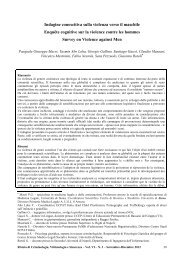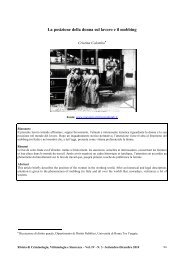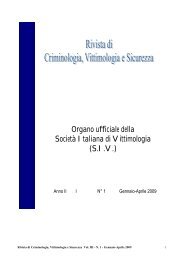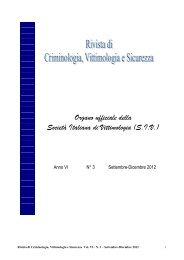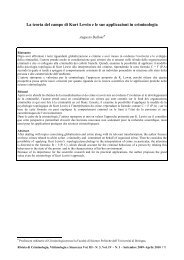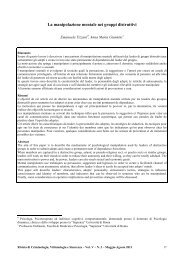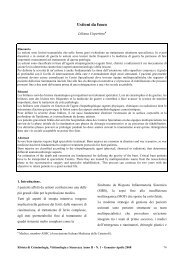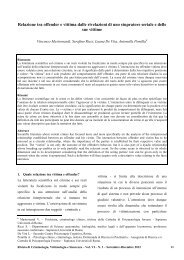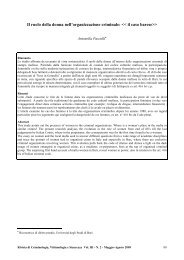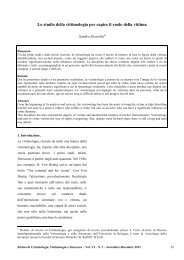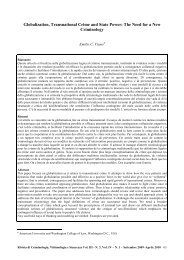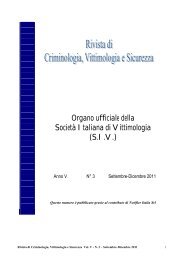Anno 2, Numero 3, Settembre-Dicembre 2008 - Vittimologia
Anno 2, Numero 3, Settembre-Dicembre 2008 - Vittimologia
Anno 2, Numero 3, Settembre-Dicembre 2008 - Vittimologia
You also want an ePaper? Increase the reach of your titles
YUMPU automatically turns print PDFs into web optimized ePapers that Google loves.
Information Communication Technology & Crime: the Future of Criminology<br />
Arije Antinori •<br />
Riassunto<br />
Fino ad oggi il XXI secolo può essere considerato come il secolo della rivoluzione tecnologica. L’incremento dei flussi<br />
comunicativi ha prodotto un’evoluzione nell’economia globale e nella diffusione globale di Internet e della telefonia mobile<br />
in cui le nostre vite sono immerse. Tutto ciò rappresenta il principale fattore di cambiamento sociale.<br />
Nuovi modelli di devianza e di criminalità possono essere reperiti nel cyberspazio così come i gruppi terroristi tradizionali<br />
ricorrono ad un uso massivo dei nuovi media. Tuttavia, occorrerà prestare un’attenzione speciale al fenomeno denominato<br />
Jihad Digitale.<br />
Quale ruolo giocano i media nel terrorismo contemporaneo? Che cosa sono Infowar, Netwar e Mediawar? Che riflessioni<br />
effettuare sulla cultura del crimine e sulle sue relazioni con la tecnologia? Che cos’è l’Open Source INTelligence?<br />
Oggi il criminologo deve conoscere l’importanza della cultura digitale, così come egli necessita di un possedere un bagaglio<br />
di conoscenze relativo alle tecnologie dell’informazione e delle comunicazioni al fine di prevenire e reprimere il crimine.<br />
Egli utilizza le sue competenze anche nell’oceano dell’open source per prevedere i trend del crimine del futuro.<br />
Résumé<br />
Jusqu’à présent, le XXI e siècle peut être considéré comme le siècle de la révolution technologique.<br />
L’augmentation des flux de communication a engendré une évolution de l’économie globale et de la diffusion globale<br />
d’Internet et de la téléphonie mobile dans lesquels nos vies sont plongées. Tout cela représente le principal facteur des<br />
mutations sociales.<br />
De nouveaux modèles de déviance et de criminalité voient le jour au sein du cyberspace, de même que les groupes<br />
terroristes traditionnels emploient de manière intensive les nouveaux médias. Toutefois, il faudra faire tout particulièrement<br />
attention au phénomène qualifié de « Jihad Digitale ».<br />
Quel est le rôle des médias dans le terrorisme contemporain ? Que sont l’Infowar, le Netwar et le Mediawar ? Quelles<br />
réflexions peut-on faire à propos de la culture du crime et de ses relations avec la technologie ? Qu’est-ce que c’est que<br />
l’Open Source INTelligence ?<br />
Aujourd’hui, le criminologue doit connaître l’importance de la culture numérique, de même qu’il a besoin d’un savoir-faire<br />
lié aux technologies de l’information et de la communication dans le but de prévenir et de contrôler la criminalité. Il utilise<br />
également ses connaissances dans l’océan de ‘l’open source’ afin de prévoir les tendances de la criminalité.<br />
Abstract<br />
Today the 21st century can be considered the century of the technological revolution.<br />
The increase in communication flows has brought about an evolution in the global economy and the global spread of<br />
Internet and mobile communication, all of which affect our lives significantly and are key factors of social change.<br />
New models of deviance and crime can be found in cyberspace as well as in traditional terrorist groups who resort to a<br />
massive use of this new media. Therefore special attention should be given to the phenomenon referred to as ‘Digital Jihad’.<br />
What is the role of media in contemporary terrorism? What about Infowar, Netwar & Mediawar? What can be said about<br />
criminology and its relationship to technology? What is the impact of Open Source INTelligence?<br />
Today criminologists have an obligation to understand the importance of digital culture and acquire the skills in Information<br />
Communication Technology required to prevent and counteract crime. They must also use their skills in the open-source<br />
ocean to envisage future trends in crime.<br />
1. Globalization of fear.<br />
Most frightful fear is the diffused, spread, indistinct,<br />
free, unmoored, fluctuating, destitute of an address or<br />
of a clear cause fear; the fear that oppress us without<br />
a reason, the threat that has to fear and that is<br />
glimpsed everywhere, but is not never clearly shows.<br />
"Fear" is the name that gives to our uncertainty, to our<br />
ignorance of the threat, or of that we have to do.<br />
• Ph. D. student in Criminology, University of Bologna.<br />
(Zygmunt Bauman, Liquid Fear)<br />
The end of '80s, on a geopolitical level have<br />
caused the transition from an hard bipolar to a<br />
multicentric and multiactorial scenario. That is<br />
Rivista di Criminologia, <strong>Vittimologia</strong> e Sicurezza Vol. II - N. 3 - <strong>Settembre</strong>-<strong>Dicembre</strong> <strong>2008</strong> 23



